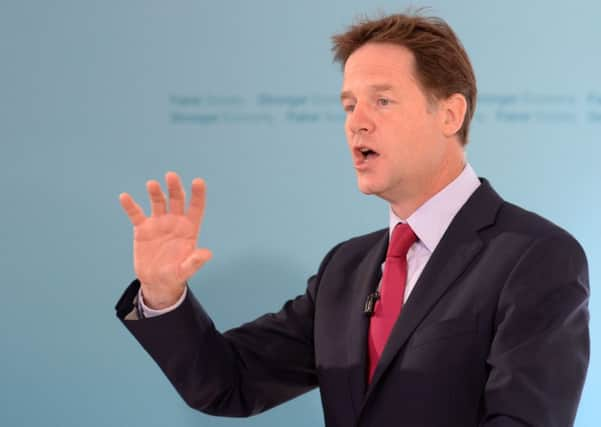Scottish independence: Clegg seeks more devolution


The Deputy Prime Minister will say that an emerging consensus among the three main political parties meant there was a real opportunity to devolve power to the English regions.
However, the Conservative Communities and Local Government Secretary Eric Pickles cautioned against calls for the creation of powerful new combined local authorities centring on big cities.
Advertisement
Hide AdAdvertisement
Hide AdMr Clegg is launching a report by the IPPR North think-tank, calling for a new wave of “metro mayors” for city regions with greater powers to vary taxes to local councils.
In his speech, the Liberal Democrat leader will say the time has come to push for action on decentralisation.
“You only need look at how the Scottish referendum debate has re-energised people’s interest and engagement in politics over the last few weeks to see that this is an idea whose time has come,” he will say.
“Over the last decades, we’ve seen a wave of new powers shifting out to every nation of the UK, except England.
“With a new consensus now emerging amongst the UK’s three main political parties to extend devolution and decentralisation in the future, I believe we can push forward in realising our ambitions for a stronger, fairer Britain.”
The IPPR report identifies 40 different functions of government which need to be devolved and covers powers and budgets held in 13 different Whitehall departments.
If adopted, the 10-year plan would lead to a new wave of combined authorities, such as in Greater Manchester, with the possibility of directly elected “metro mayors” for city regions.
Advertisement
Hide AdAdvertisement
Hide AdIt calls for fiscal devolution to be a central plank of the 2015 comprehensive spending review, with five-year funding settlements agreed and an independent body established to take forward further central-local funding reforms.
The plan could eventually lead to property taxes and business rates being devolved to combined authorities and, eventually, a proportion of income tax being assigned to them.
IPPR North director Ed Cox, said: “Whichever way Scotland votes next week, Edinburgh will get new powers and widen the gap with local leaders across England.
“England has waited patiently while Scotland, Wales and Northern Ireland have been given ever great devolution. Now is the time to redress the balance and devolve powers to English city-regions.”
Mr Pickles said that while there was “real scope” for further devolution of power in England, he questioned whether the creation of combined authorities was the right approach.
“Localism in England should be about devolving power to the lowest appropriate level - down to councils, to neighbourhoods and to individuals,” he said.
“There may be some role for combined authorities on a strategic level to promote economic development and transport, but there is a real risk they will suck power upwards away from local councils and local taxpayers.”